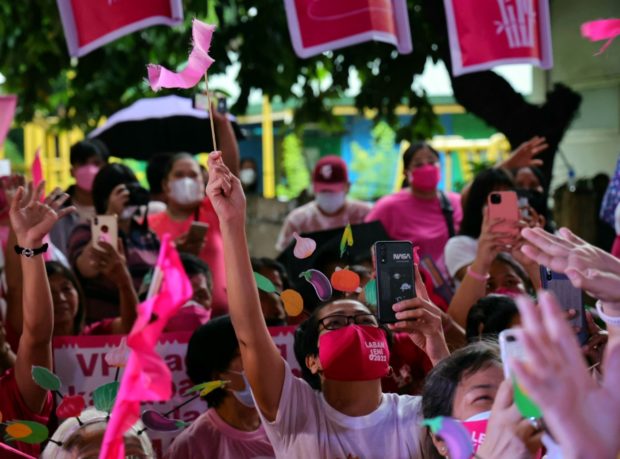Roadblocks to Leni rally? LTO chief explains

Pink and purple hues mixed at the Villasis People’s Rally as supporters of the top eggplant producer of the country rallied for presidential candidate Vice President Leni Robredo on Friday, August 8, at Villasis, Pangasinan. (VP Leni Media Bureau)
MANILA, Philippines — It wasn’t political, we were just doing our job, Land Transportation Office (LTO) chief Edgar Galvante explained after critics pounded transport authorities for stopping passenger vehicles that were carrying supporters of Vice President Leni Robredo to her presidential campaign rally in Urdaneta, Pangasinan, on Friday.
“The reason they were apprehended was not because they are on the way to the rally — they (Robredo supporters) are telling a different story here — but because of the [‘Oplan Ligtas Biyahe’],” Galvante told the Inquirer a day after the rally.
He said that drivers of public utility vehicles (PUVs) needed a special permit to transport people outside of their assigned franchise routes.
“Let me emphasize here again, if they will go out their line, they need to secure that permit or authority and that would be given to them,” Galvante said. “Regardless of the political parties or whatever, what we are only observing is that they are traversing the routes indicated in their franchise.”
Buses and jeepneys that were hired by Robredo’s local supporters were pulled over and warned not to proceed, delaying the arrival of many of the rally crowd that eventually grew to around 76,000.
Article continues after this advertisement‘Not first time’
Robredo said she was informed about the roadblocks in Pangasinan and that it was “not the first time” that this happened in her campaign sorties.
Article continues after this advertisementShe said that if the intention was to discourage her supporters from participating in her campaign rallies, the action by the police and transport authorities achieved the opposite because the “kakampinks” became “even more fired up.”
“They became even more determined to show their support,” Robredo said.
Galvante said the vehicles were stopped in accordance to Oplan Ligtas Biyahe, which had been implemented yearly during the Lenten season to ensure safety on the road for Filipinos who travel by land during the holiday.
Unlike past ‘Oplan’
His reason, however, was not consistent with past directives on the purpose of Oplan Ligtas Biyahe set by his predecessors and the then-Department of Transportation and Communications (DOTC).
A 2013 memorandum for the Oplan Ligtas Biyahe only directed LTO regional directors and their enforcers to “shift to assistance mode” and conduct safety audit of motor vehicles and PUVs in identified terminals.A 2016 Oplan directive by the DOTC, did not order enforcers to check whether vehicles had special permits to travel outside their assigned routes.
It just reminded expressway operators to strictly implement traffic rules to avoid “unfavorable incidents.” It ordered patrols deployed to areas where vehicles had been stoned.
Now it’s suspended
It also advised the public against taking “colorum vehicles as these do not have legitimate passenger insurance policies to cover accidents.
Galvante said that to quell “misinterpretations” that LTO enforcers were only targeting Robredo supporters, he ordered his Ilocos region director to suspend implementation of the Oplan “until all the rallies there are done.”
“The supporters [of Robredo] are not the subject of this operation. The drivers themselves know that they can’t get out of their line or out of their routes,” Galvante said.
He said he told the regional director that “we should just caution [the PUV drivers], so there would be no disturbances or be given color for our actions.”PUV drivers and operators, however, reported that they were forced to disembark passengers because the authorities threatened to cancel their franchises if they continued on with their trip to the rally.
In a tweet, the volunteer group Dapat Si Leni! Pangasinan said that “13 out of 15 vehicles were discouraged from rendering their services and opted to back out” from Friday’s Talindeg Grand Rally.
Special permit
Social media posts showed pink-clad passengers getting off at the roadblocks and walking to the rally site. Others traveled by boat, some waving pink flags.
Galvante specified what could turn out to be a big red tape that PUV drivers and operators would have to cut through just to get people to rally sites.
He said that before going “out of line,” they must first get a special permit from the Land Transportation Franchising and Regulatory Board to allow them to pass on roads outside their routes.
In applying for this special permit, a PUV driver is required to specify his destination and the roads he would use to get there, and state when he expects to reach it.
The bus or jeepney driver must also attach to the application a copy of the vehicle’s franchise and the LTO-issued official receipt and certificate of registration.
The out-of-line rule has often been cited by police and traffic enforcers in blocking protest caravans and the movement of rally participants in other parts of the country, including Metro Manila.